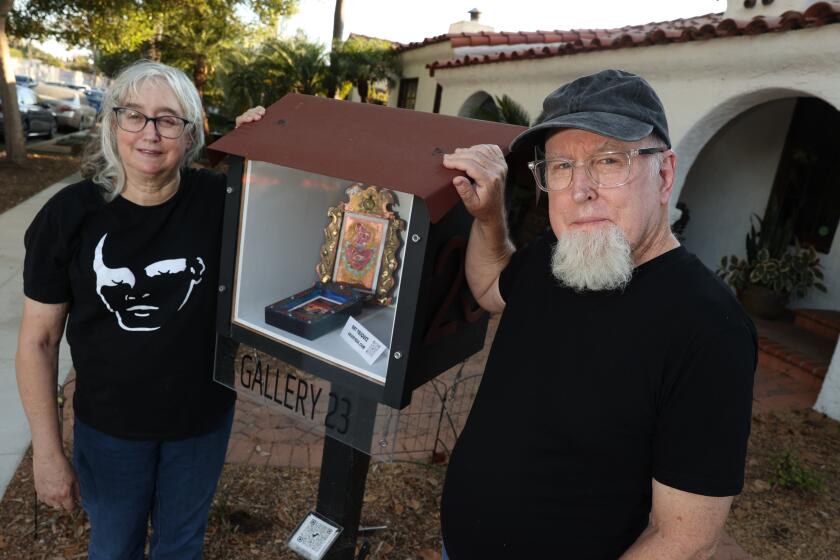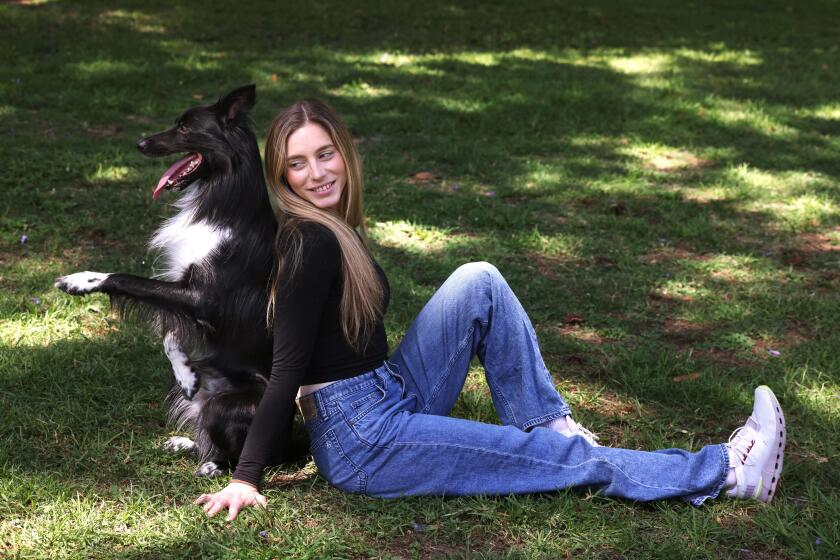Review: With the Ringling era ending, two acrobatic shows fly high with modern takes on the circus
"Give them bread and circuses and they will never revolt," wrote the satirist Juvenal of the common people of ancient Rome. He saw them as all too willing to trade their democratic freedoms for the trivial appeasements of food and fun.
These days, we common people might ask Juvenal to cut us a little slack. We've been taking civic responsibility quite seriously lately — monitoring news of our new president, lobbying representatives, marching on Washington. A couple of hours at the circus — well, that wouldn't necessarily mean we’re shirking our democratic duties. We could just need a nice evening out.
Coincidentally or not, two traveling troupes recently came through Los Angeles, offering cheerful distractions in a politically fraught time. “Circus 1903” brought to the Hollywood Pantages a nostalgic evocation of “the golden age of circus.” The Broad Stage in Santa Monica, meanwhile, hosted the Canadian company Les 7 Doigts de la Main’s “Cuisine & Confessions,” a playful, implausible marriage of acrobatics and cooking that culminated in warm banana bread shared with the audience.
The circus, for many, represents nostalgia for a “simpler” past — although that past can be tricky to reconcile with the injustices embedded in history. Growing awareness of the suffering of some circus animals, for instance, tarnished the ol’ Big Top magic over time. Audience tastes have shifted. After more than a century in operation, the Ringling Bros. circus recently announced that it will cease operations in May. Under criticism from animal rights groups, the company had already phased out elephants from its acts.
Back in 1903, you probably couldn’t have a circus without at least one stately pachyderm stepping on and off its little stool, its enormous ears nobly rippling under a fez. “Circus 1903” offers two — a mother and a baby named Queenie and Peanut — but both are life-sized puppets, designed by Mervyn Millar and Tracy Waller for Significant Object, the company that created the puppets for “War Horse.”
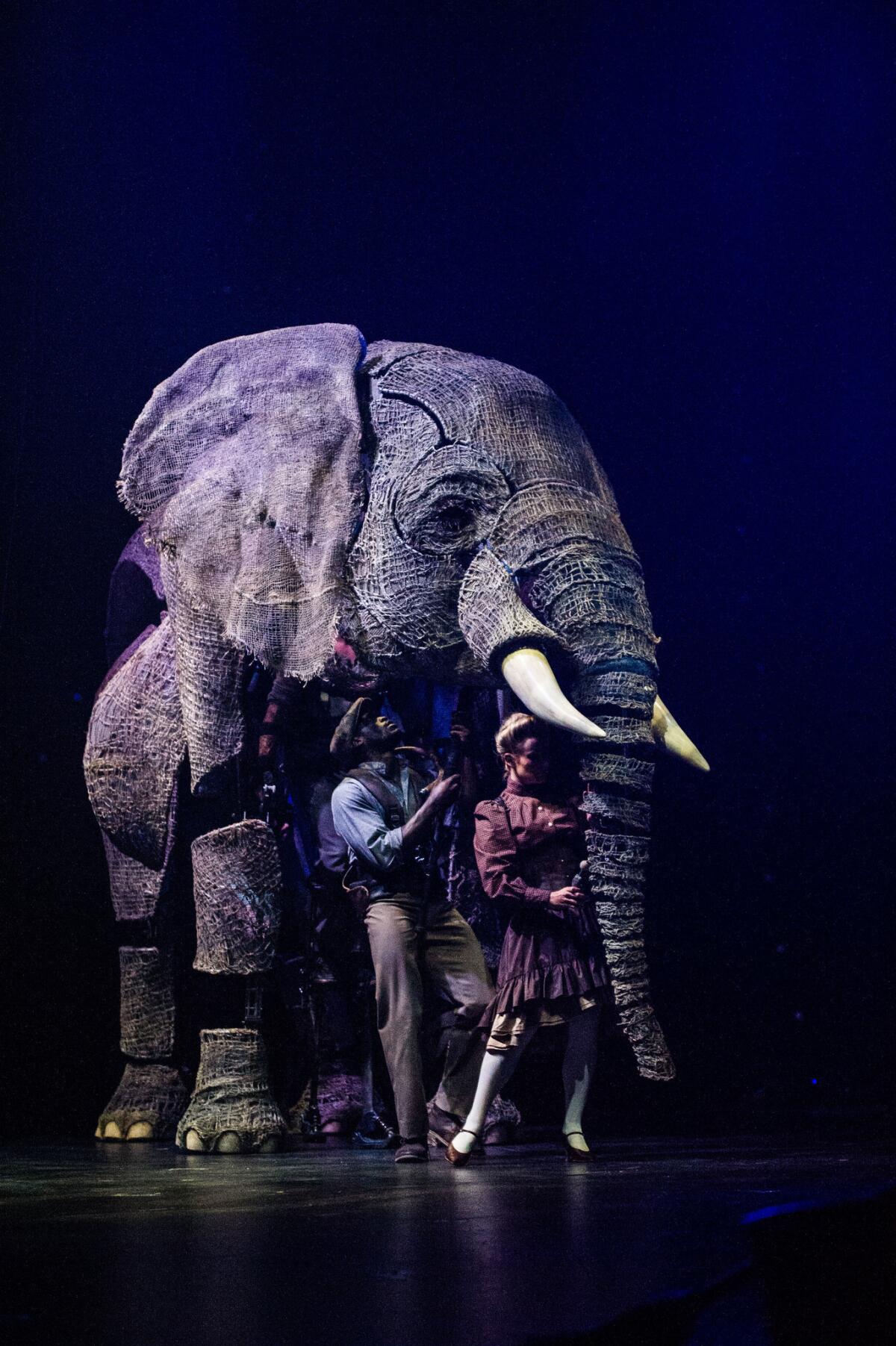
Like Joey, the ersatz horse in that production, the elephants in “Circus 1903” make no effort to conceal their artifice. The stunning Queenie is a translucent gray exoskeleton with three humans visibly ensnared in her inner workings, strapped into harnesses, busily manipulating the levers that power each shambling step of her hinged legs. The smaller, friskier Peanut is obviously a person in an elephant costume. Yet their gestures are so distinctively and beautifully elephantine that it’s impossible not to develop affection for them as creatures unto themselves.
The real secret weapon of “Circus 1903” is its ringmaster, Willy Whipsnade, played by the magician David Williamson (who toured in “The Illusionists,” a magic show produced by the same team). Williamson, tall and imposing, with a bushy white mustache, a booming voice and a quick wit, is now my Platonic ideal of a ringmaster. His Whipsnade has a faintly disreputable, carny edge; he’s the sort of irresistible showman you know will send you home flat broke but happy. He keeps the action moving at a nice pace as emcee, but the show is even more fun when he is the main attraction, inviting children from the audience to the stage and making gentle, hilarious sport of them.
The rest of “Circus 1903” is, well, a circus: Acrobats in deliciously turn-of-the-century-style outfits by Angela Aaron (heavy on the stripes, suspenders and high-waisted pants) do some amazing things. The first act is set outside the circus tent. The Flying Fins, a grinning muscular threesome, perform flips using a seesaw; the Cycling Cylone rides a bicycle in positions you can’t imagine; and a sideshow features a contortionist called the Elastic Dislocationist.
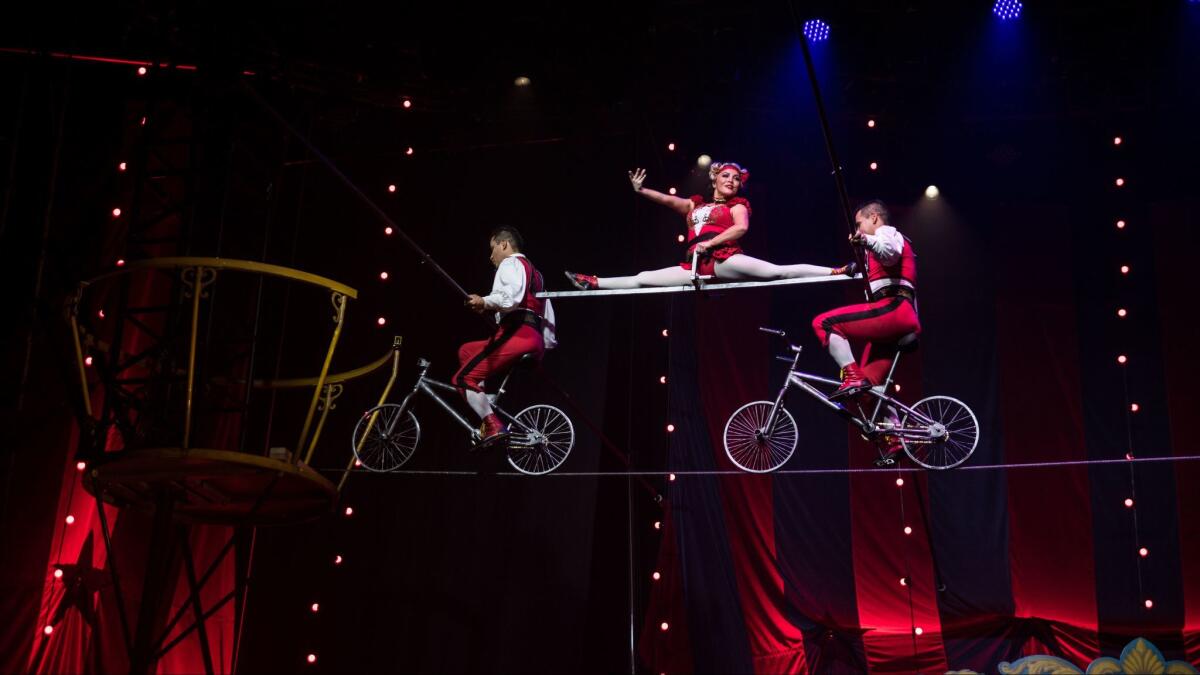
Right before intermission, the set by Todd Edward Ivins is gorgeously transformed with striped fabric walls as the action moves into the big top. More stunts follow in Act II: Les Incredibles, an enormous Russian man who flings his tiny Canadian wife through the air; a stunning aerialist known as Lucky Moon; a family of three, Los Lopez, disporting themselves on the high-wire. Evan Jolly’s melodious and stirring original score — complete with pauses at suspenseful junctures, in which the performers’ grunts can be heard — adds to the magic.
Each act, selected with care, hints at a lifetime of passionate commitment to an idiosyncratic, taxing, life-threatening specialty. But the most astonishing and varied physical feats can lose impact when too many are strung together, and ultimately “Circus 1903” feels a little anticlimactic. For all of the love and effort lavished on this enterprise, is there a deeper message we’re meant to be absorbing? What is the meaning of a circus?
“Cuisine & Confessions” by Les 7 Doigts de la Main uses the same ingredients in an innovative, not to say counterintuitive, new recipe. Let’s admit from the outset that performing high-risk acrobatics in a kitchen, while food is being prepared, sounds like a bad idea. But that’s the concept: Nine accomplished athletes, four women and five men, perform jaw-dropping stunts individually and in groups while cooking omelets, pasta and banana bread. Vegetables are chopped, eggs are thrown around, water is boiled, and miraculously, nobody is gored or egged or singed — though some of the performers do get pretty floury.
Creators Shana Carroll and Sébastien Soldevila, two of the founding directors of 7 Doigts, have choreographed and performed for Cirque du Soleil, and this company feels like a younger, funkier cousin of that global juggernaut.
The acrobats hang out onstage and around the house as the audience files in, embracing and bantering with them. Wearing casual clothing with a 1950s vibe by costume designer Anne-Séguin Poirier — the women in jeans, frills and gingham — they approach a stand microphone from time to time and address the audience in different languages. “Does anybody have any olives?” one asks. They invite audience members onstage to chop veggies. They could be college students in cooperative housing except that their kitchen, a set by Ana Cappelluto, is too clean.
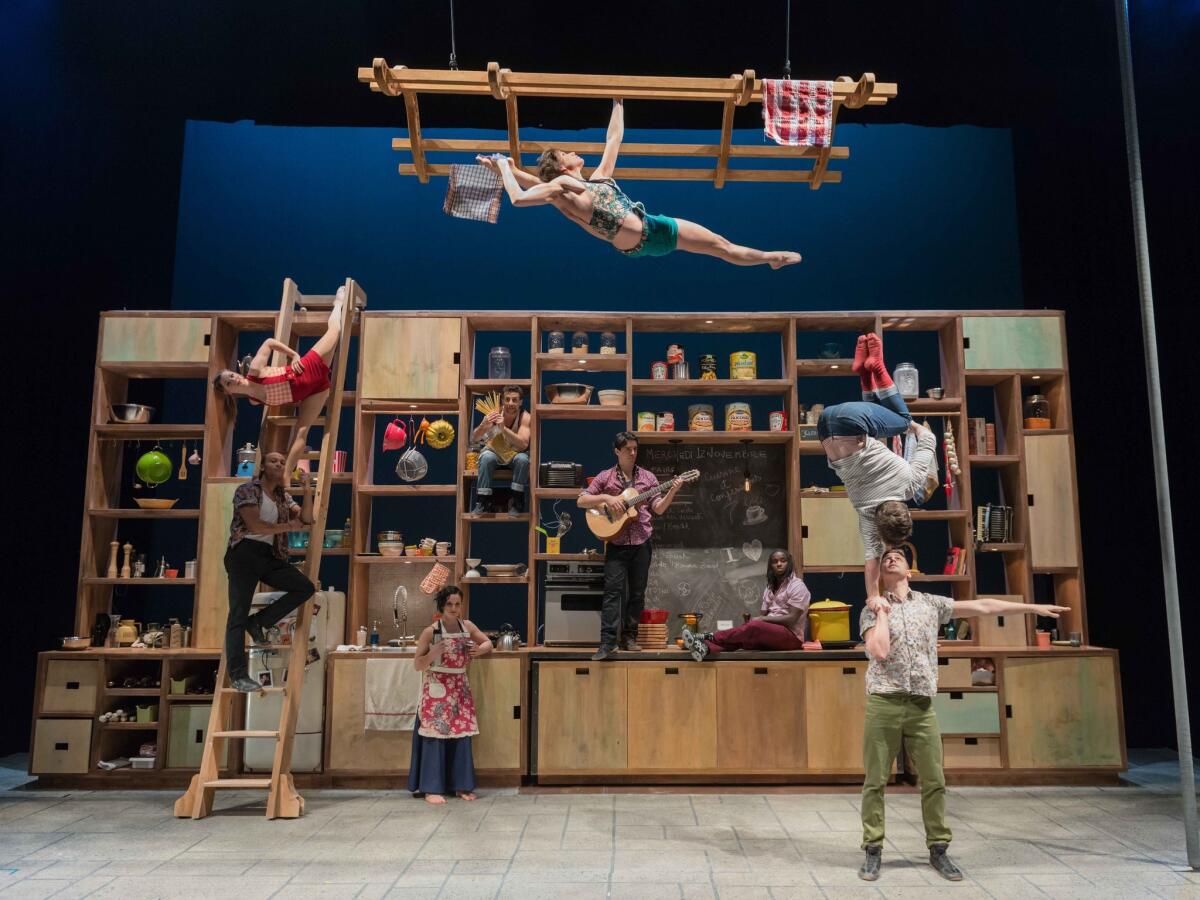
SIGN UP for the free Essential Arts & Culture newsletter »
This laid-back vibe makes it all the more impressive when cast members break into group acrobatics, credited to Jerome Le Baut, that clearly demand meticulous timing. People and objects get flung through the air by one person, only to be caught by somebody clear across the stage who seems to have wandered by at the right moment. Meanwhile, others are dangling from the pot rack, sliding down poles headfirst and flipping along the countertops.
It all can be dizzying, and fortunately there are plenty of smaller-scale acrobatic performances for those who prefer a narrower focus of amazement. Sidney Iking Bateman and Melvin Diggs perform a stunning duet in which they hoop-dive through wooden picture frames to voice-overs of (presumably) their own bittersweet childhood food memories.
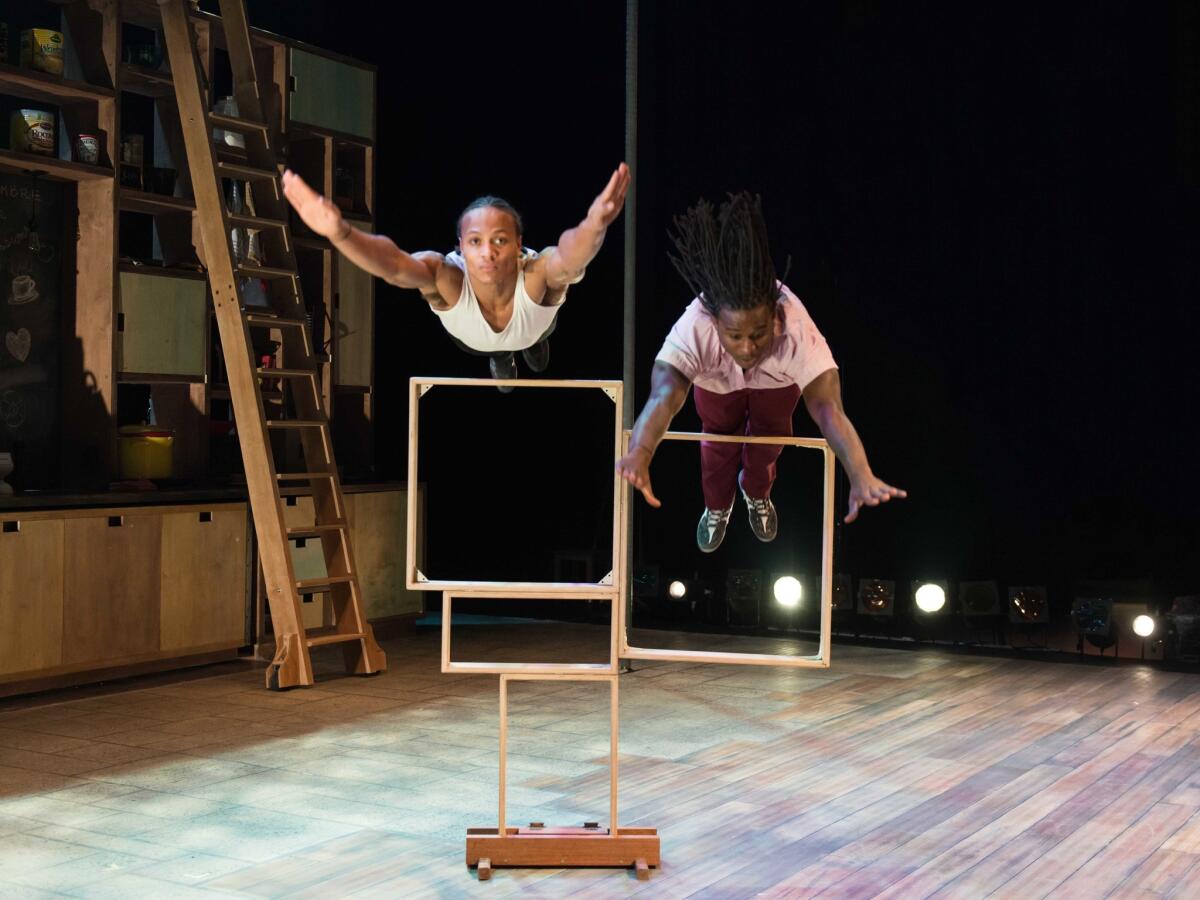
Anna Kitchenko, while hanging out dishcloths to dry, becomes entangled in what looks like a giant picnic blanket and is dragged up into the air, where she performs a dazzling aerial routine. Matias Plaul reminisces tenderly about the father he never knew, a victim of Argentina’s military government, repeatedly interrupting the story to fling himself onto the Chinese pole and do frightening things that leave him out of breath but no less eloquent.
If at times a bit scattershot and artsy, this collection of stunts is unified, like so much human interaction, by food. After the banana bread goes into the oven, the audience is asked to set phone timers for 36 minutes, on vibrate. When the bread is ready, the theater hums with anticipation, and everybody is invited to join in a light feast of veggie pasta and bread.
Yes, bread and circuses: Juvenal might roll his eyes, but it’s possible that he underestimated the community-building power of these phenomena.
Follow The Times’ arts team @culturemonster.
ALSO
Times theater critic Charles McNulty’s latest reviews
'Come From Away,' 'Amélie' and the long, bumpy road from West Coast to Broadway
Don't call it a shadow puppet show. For Manual Cinema, this is the art of 'live film'
Al Pacino and the role that pulled him to the Pasadena Playhouse stage
'Zoot Suit': How Latino theater born in the farm fields changed L.A. theater
The biggest entertainment stories
Get our big stories about Hollywood, film, television, music, arts, culture and more right in your inbox as soon as they publish.
You may occasionally receive promotional content from the Los Angeles Times.



